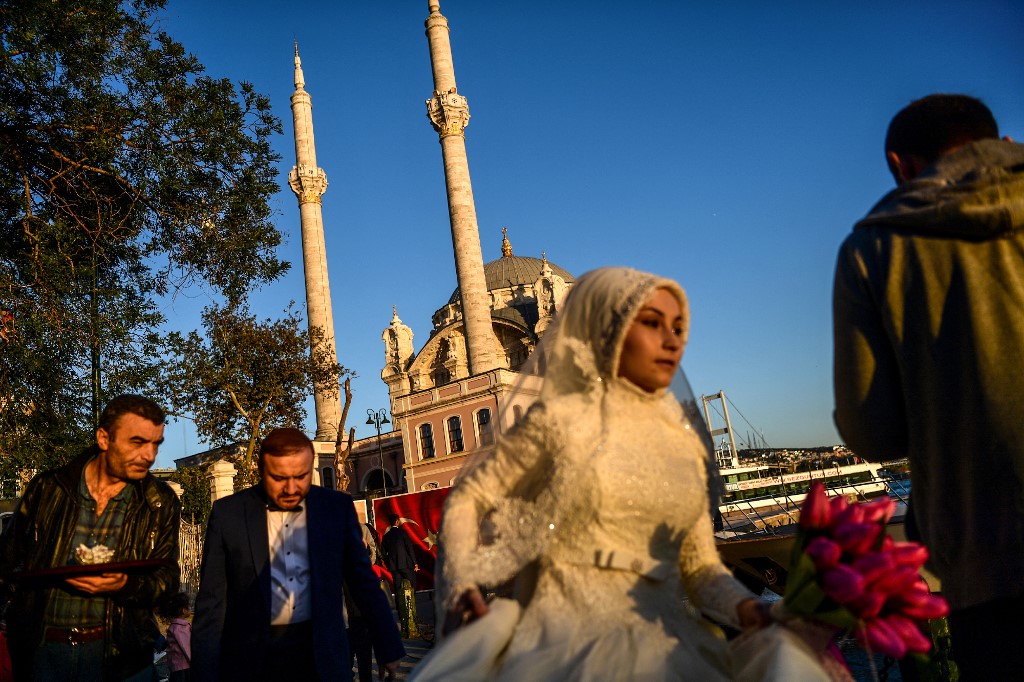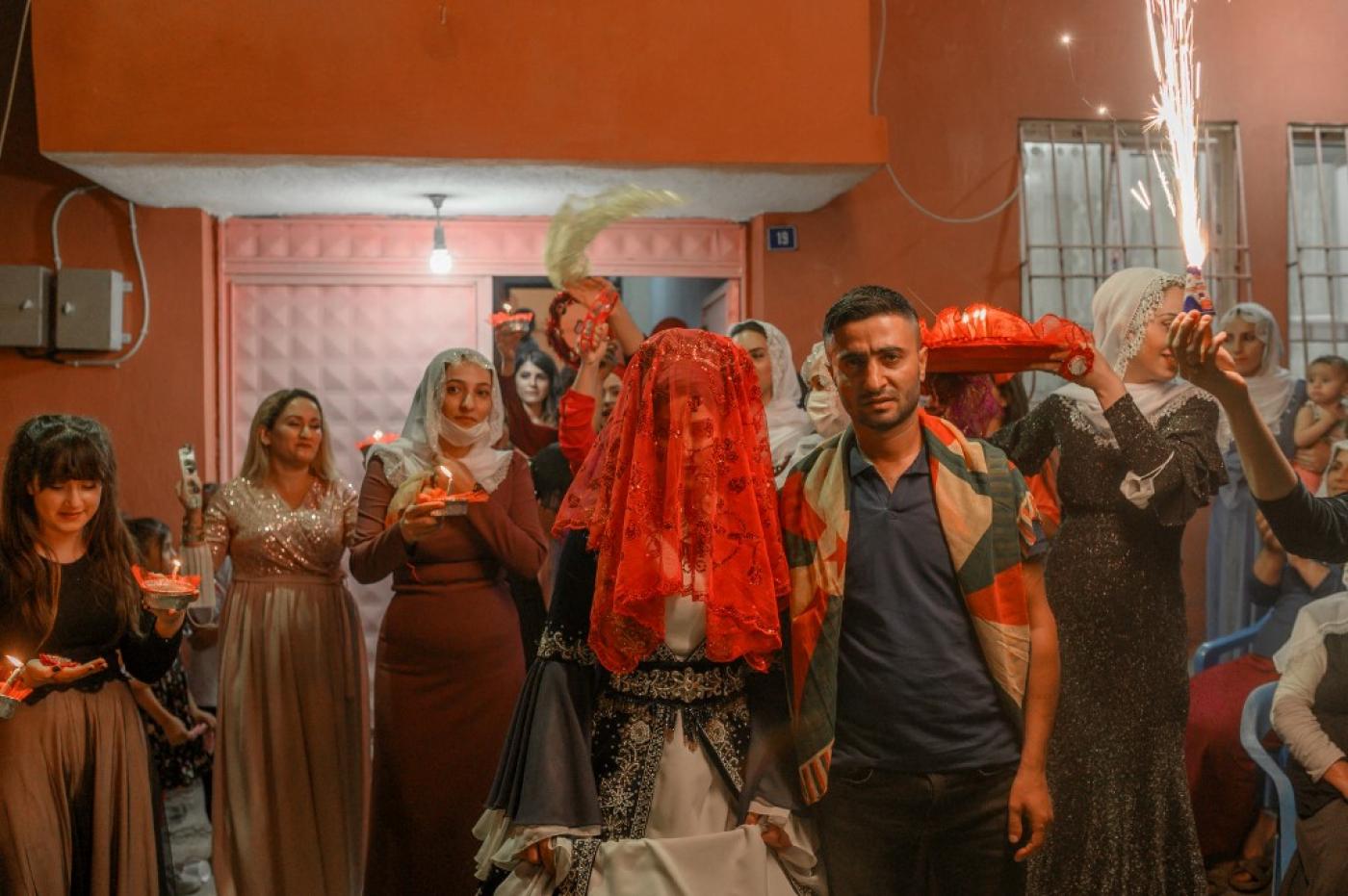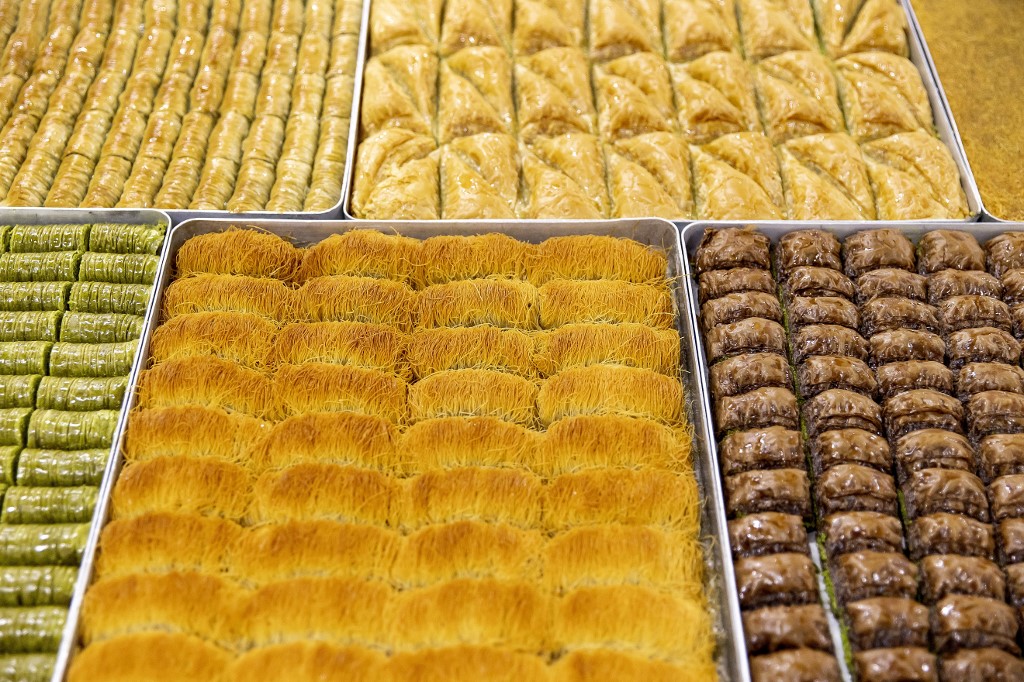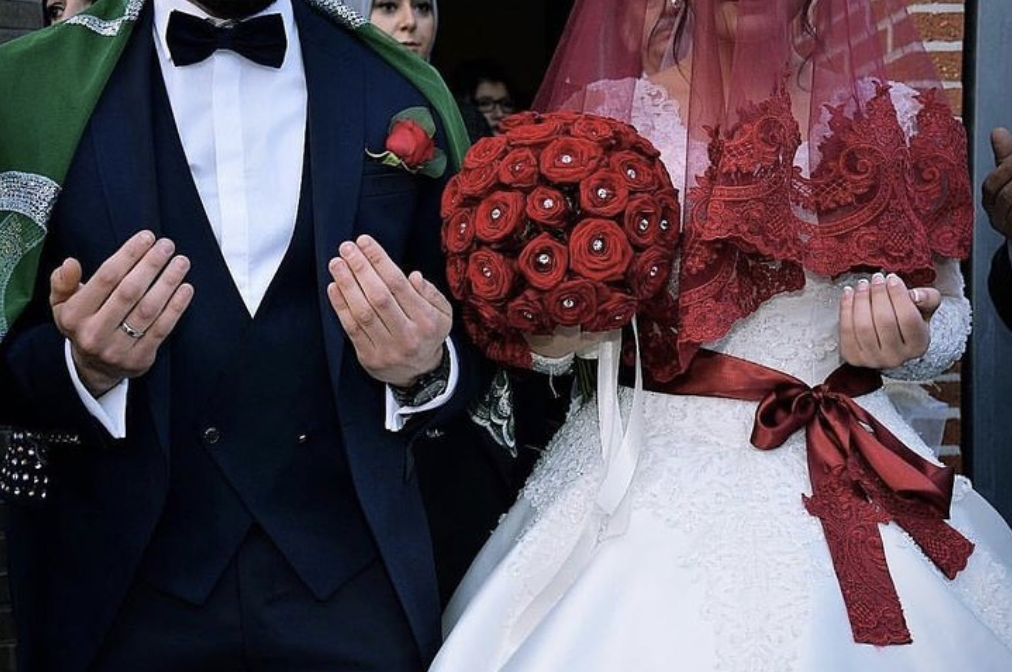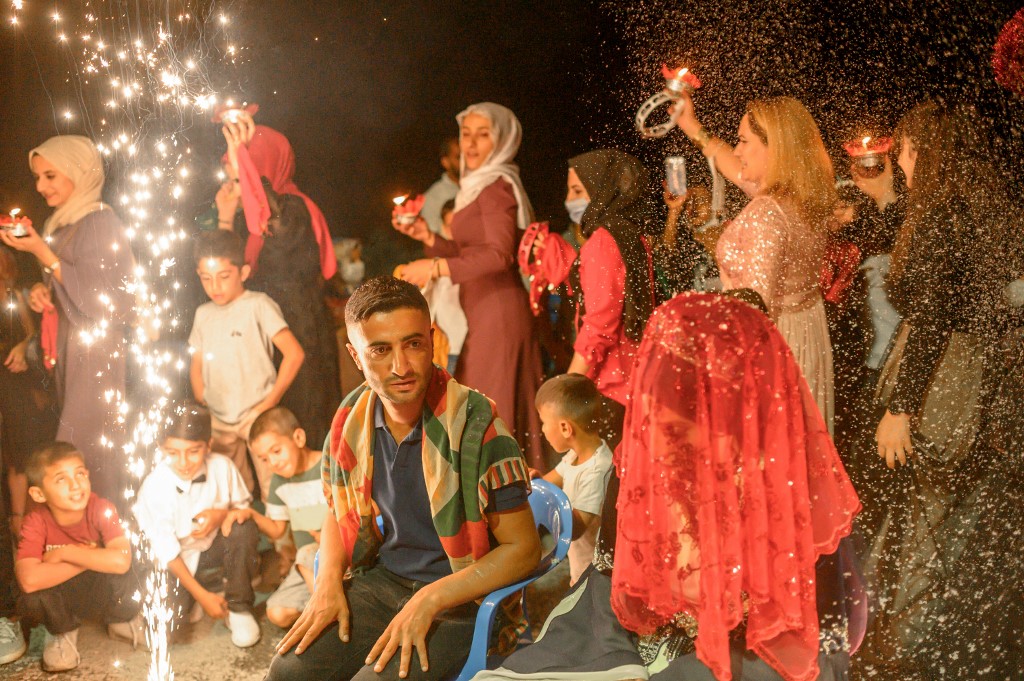Salty coffee and foul play: An inside look at Turkish weddings

Although most wedding planning is typically left to the bride and groom-to-be, in Turkish weddings their parents also have a strong presence throughout the various stages.
The reason being is that Turkish weddings are hugely symbolic - not only in celebrating the newlyweds future together but also in marking their two families merging together.
Stay informed with MEE's newsletters
Sign up to get the latest alerts, insights and analysis, starting with Turkey Unpacked
The weddings are laced with unique and somewhat unconventional traditions, many of which stem from ancient times as well as religious rites.
Although today many people are choosing to opt for more simple weddings, abandoning some of the long-held customs, some of these traditions still feature prominently.
Here, Middle East Eye takes you on an interesting - and sometimes surprising - journey into a classic Turkish wedding, with all it entails, as part of a series on wedding traditions from around the region.
Stay tuned for the next part, which will be published next week.
Salty coffee and rejected before accepted
In traditional Turkish weddings, planning of the event cannot commence until the "kiz isteme" takes place. This ritual is where the parents of the groom pay a visit to the bride-to-be's home, asking for her hand in marriage.
For Muslim families, a key part of this step is a taking part in a custom which dates back to the early days of Islam. At this stage, an elder in the family will say: “on Allah’s order and the sunnah (practices) of the prophet Mohammed, we want your daughter for our son.”
Although an important step of initiating the marriage process, in some regions such as Trabzon and Ordu, the custom pans out just like a game.
During the first two times the groom’s family visit, the bride-to-be’s family will refuse to give their consent for marriage, forcing the groom’s side to come back, and request for her hand in marriage over and over.
Typically, by the third or fourth visit, the bride-to-be’s father will stop pretending, and give in, giving his blessing for the wedding preparations to continue.
To show respect for the elders in the family, the bride and groom will kiss the hands of the elders, thanking them for their approval.
One of the most widely-known customs is when Turkish coffee is dosed with large spoonfuls of salt and served by the bride to the groom. The custom is seen as both a test of the groom’s demeanor and a symbol of the fact that marriage is not always sweet.
If the groom is able to finish the cup of coffee without displaying displeasure at the taste, it is believed that he has a good temperament.
“Payment” for the bride
In small, conservative villages and towns the groom’s side has to make a payment to the bride’s family in cash or sometimes in cattle, or other material wealth before the wedding.
The custom, called "Baslik", has historically caused some long feuds between families. In the past, when young men couldn’t afford the baslik money, their brides were forced to marry somebody else who could come up with the money.
In some regions of Turkey, many men are expected to own a home before the bride-to-be’s family gives consent for the marriage to go ahead.
For this reason alone, more and more people are choosing to elope in Turkey.
Gold coins and henna night
The "Ceyiz", or dowry for the bride, is a long held tradition which mothers and daughters have bonded over for generations. The Ceyiz, is a package of essentials for the newlywed that typically contains quilts, bedding sets, clothing, and homeware, and is put together by those closest to the bride.
The henna night, also known as the "kina gecesi", is reserved for females only. This ceremony, which is held at the bride’s family home, is an intimate affair.
In some regions, the bride will don a colourful gown called the "bindalli", and sit in the middle of a circle of guests wearing a red veil. The colour red holds particular importance, symbolising good luck and positivity.
In a bid to convince the bride to open her hands to be covered in henna, the women on the groom’s side will ‘bribe’ her with a gold coin. The coin is placed either inside the henna or in the bride’s palm for good luck and abundance. Henna, which symbolises bride’s acceptance of her new role as a wife, is first applied to the right hand (the right side is considered sacred in Islam) and wrapped with a traditional “dolak” cloth.
The day is concluded with dancing and songs which continue on into the early hours of the morning.
At the event, the women will share cheese and spinach stuffed pastries, and traditional sweets, including halva.
According to a research done by Meltem Emine Santur, at the Cukurova University, Turkology Research Center in Turkey, the henna night was a solemn ceremony in the early days of Islam because of its marking of the bride’s last night in her parental home before going to live with her husband.
Today, this is still apparent in the popular folk song Yuksek, Yuksek Tepelere which starts with the line: “don’t give your girl away to the high, high hills".
Kidnapping, dressing up and abuse
The pre-wedding rituals on the groom’s side - the "Damat donatma" or “dressing of the groom” - are very different from what happens at the henna.
First a Turkish carpet is laid on the floor. Then the friends of the groom gather to get him out of his bachelor clothes’ and dress him in his wedding suit while singing traditional songs.
In the city of Mus, before putting on the suit, the groom appears in front of the guests in his underwear, turns around three times, and only then he is allowed to put on his suit.
In the morning of Damat donatma, if any of the groom’s friends oversleep or do not show up on time to participate in the event, the men go to their home and wake them up by pouring cold water over them.
In other regions, the friends of the groom carry out slightly more unorthodox practices.
One of the most widely known traditions is called the known as "Arap", "Arab", or "Kiz kacirma" (meaning "girl kidnapping").
All the men wear women’s clothes and put on heavy makeup to look like women. Then they start running around try to “kidnap” one another as if they were women they were trying to kidnap for marriage.
During this game a character called "coban", or shepherd tries to beat the runners with his cane or a stick.
On the morning of his wedding the groom suffers from different sorts of abuse at the hands of his best friends. They make him walk around the city barefoot, cover him in sticky substances, or they might ask him to declare his love from the minaret of their local mosque.
Wedding day festivities
In some villages and small towns, unique customs are still practised.
For example, in some areas, the wedding day festivities begin with the raising of the Turkish flag in front of the groom’s house after the men return from the local mosque following the midday prayer.
A meal called 'flag dinner' is then prepared in the groom's home.
In other areas, it is customary to stick fruits and vegetables, such as apples and onions, on a flagpole, or attach items like a mirror. Later, as the bridal party approaches the groom’s door, this apple is shot with a pistol by men from the wedding party. Whoever knocks the apple down gets a baksheesh (tip) from the bride.
In some families the bride’s father or brother will tie a red ribbon around her waist which represents the ancient maidenhood belt. The tying of this red ribbon is one of the most common Turkish wedding customs.
After this, the bride’s party heads for the actual wedding ceremony, accompanied by the musicians playing zurna (a traditional woodwind instrument) and davul (bass drum).
One ritual still performed even on the streets of the modern city of Istanbul, is children and teenagers blocking the roads to stop the bridal convoy, in order for them to receive tips. The children will refuse to give way until they are tipped.
One old tribal custom which is still alive today is the firing of gunshots into the air, marking the arrival of the bride’s convoy.
Playing for dominance
One of the most entertaining customs, done right after the couple sign their marriage certificate, is the foot game. Here, the bride and groom will tussle really hard to step on each other’s feet.
This play symbolises their desire to gain dominance in the marriage. It’s said that whoever wins the foot fight would be the one calling the shots in the relationship.
After the cake is cut, red ribbons are placed around the newly weds’ necks or on their clothes. When the wedding guests approach to congratulate them, they pin large banknotes or gold coins onto these ribbons.
Punching the groom
The bride and groom’s first night as a couple is the night they are expected to consummate their marriage in light of traditions. This night of nuptials is known as the "gerdek gecesi".
But, before they enter their new home, the bride breaks a traditional clay jug called "testi". The ritual symbolises that the bride is strong and will not be broken.
In some families, the groom will sprinkle rice, wheat, sugar, and sometimes money over his new wife’s head before entering their new home.
This represents his wish for wealth, abundance, and happiness in their marriage. In Diyarbakir, a sheepskin is laid under the bride’s feet as she enters. This means the groom wishes for a bride “as docile as a sheep".
Today, some customs - which are deemed by many to be archaic - will still be carried out. These include friends and relatives of the groom hitting him on the back and beating him, an act which is believed to take away his anxiety. For the bride, she is handed a baby boy in the hopes that her first born is a male.
Although the wedding ceremonies have come to an end at this point, the newlyweds still have duties to fulfil. The couple will start receiving guests in their new home right after the wedding.
In the southeastern city of Gaziantep, these visits may go on for 60 days.
This article is available in French on Middle East Eye French edition.
Middle East Eye delivers independent and unrivalled coverage and analysis of the Middle East, North Africa and beyond. To learn more about republishing this content and the associated fees, please fill out this form. More about MEE can be found here.



